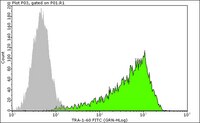Passaging and colony expansion of human pluripotent stem cells by enzyme-free dissociation in chemically defined culture conditions.
Beers, J; Gulbranson, DR; George, N; Siniscalchi, LI; Jones, J; Thomson, JA; Chen, G
Nature protocols
7
2029-40
2012
Show Abstract
This protocol describes an EDTA-based passaging procedure to be used with chemically defined E8 medium that serves as a tool for basic and translational research into human pluripotent stem cells (PSCs). In this protocol, passaging one six-well or 10-cm plate of cells takes about 6-7 min. This enzyme-free protocol achieves maximum cell survival without enzyme neutralization, centrifugation or drug treatment. It also allows for higher throughput, requires minimal material and limits contamination. Here we describe how to produce a consistent E8 medium for routine maintenance and reprogramming and how to incorporate the EDTA-based passaging procedure into human induced PSC (iPSC) derivation, colony expansion, cryopreservation and teratoma formation. This protocol has been successful in routine cell expansion, and efficient for expanding large-volume cultures or a large number of cells with preferential dissociation of PSCs. Effective for all culture stages, this procedure provides a consistent and universal approach to passaging human PSCs in E8 medium. | 23099485
 |
Variability in the generation of induced pluripotent stem cells: importance for disease modeling.
Vitale, AM; Matigian, NA; Ravishankar, S; Bellette, B; Wood, SA; Wolvetang, EJ; Mackay-Sim, A
Stem cells translational medicine
1
641-50
2012
Show Abstract
In the field of disease modeling, induced pluripotent stem cells (iPSCs) have become an appealing choice, especially for diseases that do not have an animal model. They can be generated from patients with known clinical features and compared with cells from healthy controls to identify the biological bases of disease. This study was undertaken to determine the variability in iPSC lines derived from different individuals, with the aim of determining criteria for selecting iPSC lines for disease models. We generated and characterized 18 iPSC lines from eight donors and considered variability at three levels: (a) variability in the criteria that define iPSC lines as pluripotent cells, (b) variability in cell lines from different donors, and (c) variability in cell lines from the same donor. We found that variability in transgene expression and pluripotency marker levels did not prevent iPSCs from fulfilling all other criteria for pluripotency, including teratoma formation. We found low interindividual and interclonal variability in iPSCs that fulfilled the most stringent criteria for pluripotency, with very high correlation in their gene expression profiles. Interestingly, some cell lines exhibited reprogramming instability, spontaneously regressing from a fully to a partially reprogrammed state. This was associated with a low percentage of cells expressing the pluripotency marker stage-specific embryonic antigen-4. Our study shows that it is possible to define a similar "ground state" for each cell line as the basis for making patient versus control comparisons, an essential step in order to identify disease-associated variability above individual and cell line variability. | 23197870
 |












